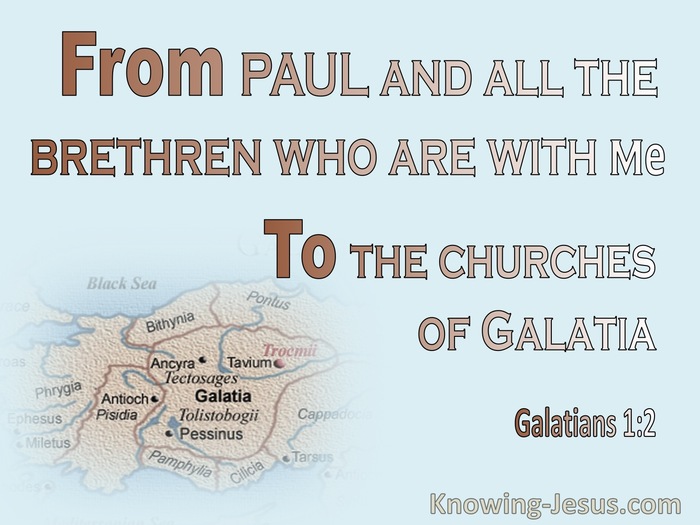◄ What Does Galatians 1:2 Mean? ►
and all the brethren who are with me, To the churches of Galatia:
Galatians 1:2(NASB)
Verse of the Day
The books of Romans and Galatians are complementary. The former is a comprehensive discourse on the foundational doctrines of the Christian faith, rooted in the gospel of the grace of God. It was sent to the Church in Rome and teaches salvation is by grace alone through faith in Christ, which has set us free from slavery to sin through the fleshly works of the Law.
The epistle to the Galatians was sent to all the believers in Galatia. Like Romans, it presents the foundational doctrines, but is also an outstanding defence of the gospel. It fiercely condemns legalism and provides doctrinal justification for the freedom we have in Christ. The former provides an in-depth treatise of the gospel, while the latter defends the gospel by strongly condemning the destructive nature of legalism which the Galatian believers had adopted.
The speed with which the Galatian church had strayed from the truth into the false 'gospel' of legalism, disturbed Paul greatly. His concern is reflected in the severe tone of his epistle. Unlike all his other letters, including the epistle to the Corinthians which criticised the behaviour and attitude of the saints there and corrected much false teaching, there are no warm introductory remarks in Galatians, no positive encouragement, and no praise for the churches in that region.
While the carnal Christians of Corinth who reverted to spiritual infancy received words of encouragement, no such praise was awarded the Galatian believers. While the Corinthians grew careless and became carnal in their Christian walk, the Galatians turned from the truth of grace to a different gospel. However concerned Paul was about carnality in Corinth, his greater concern was legalism in Galatia. They moved from liberty to law. They fell from grace and severed the freedom they had in Christ.
The Jewish legalists in Galatia besmirched the character of Paul. They denied his calling, demonised his teachings, and persuaded the Galatian believers to reject the truth and adopt a works-based, legalistic gospel. They claimed adherence to the Law and taught that works of the flesh were necessary for both justification and sanctification.
Paul knew that legalism enslaves a life, alienates a believer from Christ, and closes access to the truth. It causes them to fall from grace and places them back under the law of sin and death, rather than living in the freedom of 'the law of the spirit of life in Christ Jesus'.
Instead of promoting the freedom we have in Christ, legalism enslaves a soul which leads to defeat, and Paul needed to reinstate his God-given apostolic authority in the strongest possible terms, by stating: "Paul, an apostle (not sent from men nor through the agency of man, but through Jesus Christ and God the Father, Who raised Him from the dead.)"
The gospel Paul preached was given to him directly from the Lord Jesus and those who disagreed with him opposed God Himself. His gospel was recognised and endorsed by the other apostles, for the gospel of grace was the good news that was turning the world upside down. However, those who rejected the gospel of Paul, rejected the One Who said: "He is a chosen instrument of Mine, to bear My name before the Gentiles and kings and the sons of Israel."
There were many good men that accompanied Paul on his various missionary journeys, and many more, including the apostles in Jerusalem, who were 'with' Paul in body, in spirit, in truth, and in the furtherance of the one and only gospel of God.
Paul was commissioned by the risen, glorified Christ. He not only opened his epistle by restating his own apostolic credentials, but also stressed that his unique apostleship was not self-appointed. It did not come from the eleven apostles, nor by means of the lot they cast to replace Judas. His authority was heaven sent. His unique ministry came from God the Father Who raised Jesus from the dead, and also from the risen, glorified Lord Jesus, Himself, Whom he met on the road to Damascus.
Paul's teaching was in line with Christ's other apostles and he strongly rejected the dishonest criticism of these legalistic Judaisers who were shipwrecking the faith of the Galatians with a false, legalistic 'gospel'. Paul stood shoulder to shoulder with all Christ's apostles, together with other teachers, evangelists: "And ALL the brethren who are with me."
Paul was jealous for the truth and his condemnation of the church in Galatia should be a warning to us all of the destructive nature of legalism. Legalism is a creeping paralysis and when the gospel of grace is abandoned for this teaching, it places a believer back under the Law instead of promoting the freedoms we have in Christ.
May we never forget that living in the power of the Spirit and walking in spirit and truth is a life of liberty in the Lord. This freedom in Christ is His gift of grace. It is not a licence to sin but liberty to live for God. It empowers every man and woman of God to live a victorious life that honours the Lord Jesus and glorifies our Father in heaven.
My Prayer
Heavenly Father, thank You for the life and ministry of Paul and for the many epistles he penned, which so clearly lay out the gospel of salvation. Thank You for my great salvation, the freedom I have in Christ Jesus, and the warning against legalism in the epistle to the Galatians. Give discernment to your people today, to recognise legalistic teachings and expose those teachers who would try to bring Your people back under bondage. I pray that those that have been enticed into this destructive way of thinking would find their liberty in Christ. In Jesus' name, AMEN.
Choose a Verse from Galatians 1
Galatians 1:2 Further Study
- Galatians 1:2 in the Parallel Bible
- Galatians 1:2 in the Thematic Bible
- Galatians 1:2 Cross References
- Galatians 1:2 Treasury of Scripture Knowing
- Galatians 1:2 Sermons
- Galatians 1:2 Prayers
- Galatians 1:2 Images
- Choose Chapter
Never miss a post















